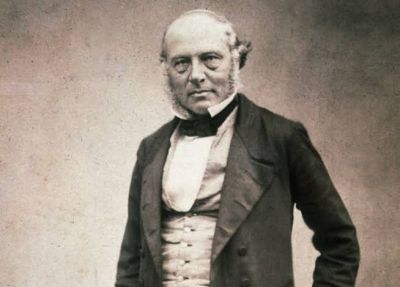Rowland Hill was a former schoolmaster, whose only experience of the Post Office in the 1830s was as a disgruntled user.
Nobody had asked him to come up with detailed proposals for completely revamping it. He did the research in his spare time, wrote up his analysis, and sent it off privately to the chancellor of the exchequer, naively confident that "a right understanding of my plan must secure its adoption".
He felt his outsider status was a positive benefit. "In few departments," he wrote, "have important reforms been effected by those trained up in practical familiarity with their details.
"The men to detect blemishes and defects are among those who have not, by long familiarity, been made insensible to them."
But Hill was soon to get a lesson in human nature. People whose careers depend on a system, no matter how inefficient it might be, will not necessarily welcome a total outsider turning up with a meticulously argued diagnosis of its faults and proposals for improvements.
"Utterly fallacious… most preposterous," blustered the secretary of the Post Office, Colonel Maberly. "Wild… extraordinary," agreed the Earl of Lichfield, the postmaster-general.
50 Things That Made the Modern Economy highlights the inventions, ideas and innovations that helped create the economic world.
It is broadcast on the BBC World Service. You can find more information about the programme's sources and listen to all the episodes online or subscribe to the programme podcast.
Brushed off by the chancellor, Hill changed tack. He printed and distributed his proposals, insisting that his lack of experience meant he was perfectly qualified for the task at hand.
He was not the only person frustrated with the system, and many who read his manifesto - and were not employed by the Post Office - agreed that it made perfect sense.
The Spectator magazine campaigned for Hill's reforms. There were petitions. The Society for the Diffusion of Useful Knowledge made representations. Within three years, the government had bowed to public pressure, and appointed a Post Office supremo: Hill himself.
What were the problems Hill identified? Back then, you did not pay to send a letter. You paid to receive one. The pricing formula was complicated and usually prohibitively expensive.
If the postman knocked on your door in the city of Birmingham, with a three-page letter from London, he would let you read it only if you coughed up two shillings and threepence.
That was not far below the average daily wage, even though "the whole missive might not weigh a quarter of an ounce", just a few grams.
People found workarounds.
Members of Parliament could send letters free of charge, so if you happened to know one, they might "frank" your letters as a favour. The free-franking privilege was widely abused. By the 1830s, MPs were apparently penning an improbable seven million letters a year.
Another common trick was to send coded messages through small variations in the address.
You and I might agree that if you sent me an envelope addressed "Tim Harford", that would signify you were well, but that if you addressed it "Mr T Harford", I would understand you needed help. When the postman knocked, I would inspect the envelope, and refuse to pay.
Hill's solution was a bold two-step reform.
Senders, not recipients, would be asked to pay for postage; and it would be cheap - one penny, regardless of distance, for letters of up to half an ounce, 14g.
Hill thought it would be worth running the post at a loss, to stimulate what he called "the productive power of the country".
But he made the case that profits would actually go up, because if letters were cheaper to send, people would send more of them.
A few years ago the Indian-born economist CK Prahalad argued that there was a fortune to be made by catering to what he called "the bottom of the pyramid", the poor and lower-middle class of the developing world.
They did not have a lot of money as individuals, but they had a lot of money when you put them all together.
Hill was more than 150 years ahead of him.
He pointed to a case when small payments from large numbers of poor people had mounted up for the government: "duties on malt and ardent spirits - which, beyond all doubt, are principally consumed by the poorer classes" brought in much more than those on "wine, the beverage of the wealthy".
Hill concluded, slightly disparagingly: "The wish to correspond with their friends may not be so strong... as the desire for fermented liquors, but facts have come to my knowledge tending to show that, but for the high rate of postage, many a letter would be written, and many a heart gladdened too, where the revenue and the feelings of friends now suffer alike."
He was right. In 1840, the first year of Penny Post, the number of letters sent more than doubled. Within 10 years, it had doubled again.
It took only three years for postage stamps to be introduced in Switzerland and Brazil, a little longer in America, and by 1860, they were in 90 countries. Hill had shown that the fortune at the bottom of the pyramid was there to be mined.
Cheap postage brought the world some recognisably modern problems: junk mail, scams, and a growing demand for immediate response. Half a century on from Hill's Penny Post, deliveries in London were as frequent as hourly, and replies were expected by "return of post".
But did the Penny Post also diffuse useful knowledge, and stimulate productive power?
A group of economists recently came up with an ingenious test of this idea in the United States. They gathered data on the spread of post offices in the 19th Century, and the number of applications for patents from different parts of the country.
New post offices did indeed predict more inventiveness, just as Hill would have expected.
Nowadays, what we call "snail mail" looks to be in terminal decline. There are so many other ways to gladden our friends' hearts.
Meanwhile, the average office worker gets well over 100 emails a day. We no longer need societies to promote the diffusion of useful knowledge - we need better ways to distil it.
But the economists who researched the link between post offices and patents argue the 19th Century postal service does have a lesson to teach us today: namely, that "government policy and institutional design have the power to support technological progress".
So what current blemishes and defects in these areas might be holding progress back?
We need Hill's successors to tell us.
Compiled by Olalekan Adeleye
BBC































































